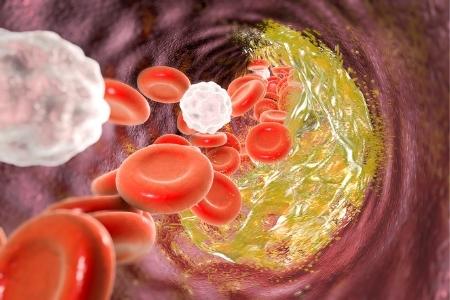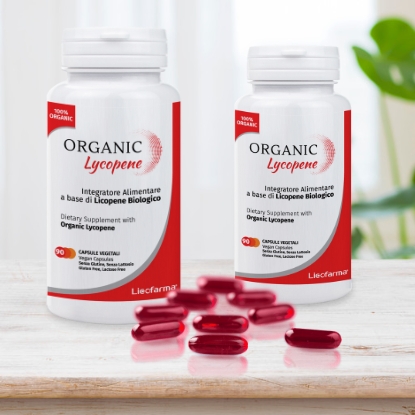Cardiovascular diseases are among the leading causes of death in the world. What everyone may not know is that these diseases, primarily heart attack or stroke, do not occur suddenly but are the end effects of another pathological condition called atherosclerosis.
In the presence of atherosclerosis, the walls of the arteries progressively lose their elasticity due to the accumulation of calcium, cholesterol and inflammatory cells that create a sort of plaque that obstructs normal blood flow. Cholesterol and hypertension are, together with smoking, obesity and diabetes, among the main risk factors for atherosclerosis.
Diet and Cardiovascular Diseases
 Various studies, over the years, have shown that in populations of the Mediterranean area the incidence of cardiovascular disease is lower and this has been associated mainly with their diet and, in particular, with the consumption of tomatoes. In general, even if the data in the literature do not seem to be completely concordant, the majority of those conducted nevertheless indicate the existence of a significant inverse association between lycopene levels in plasma or tissue and incidence of cardiovascular disease or its risk factors.
Various studies, over the years, have shown that in populations of the Mediterranean area the incidence of cardiovascular disease is lower and this has been associated mainly with their diet and, in particular, with the consumption of tomatoes. In general, even if the data in the literature do not seem to be completely concordant, the majority of those conducted nevertheless indicate the existence of a significant inverse association between lycopene levels in plasma or tissue and incidence of cardiovascular disease or its risk factors.
Lycopene and Protection of Endothelial Function
The presence of one or more of these risk factors negatively compromises the functioning of the arterial wall with damage mainly to the endothelium. The latter, which is none other than the tissue that lines the inside of the walls of the heart and blood vessels, plays a fundamental role in regulating vascular tone through the release of vasodilating substances, the most important of which is nitric oxide.
Nitric oxide, in fact, plays a fundamental role in terms of vasoprotection, since in addition to being a powerful vasodilator, it also has anti-inflammatory and antithrombotic properties.
Cardiovascular Risk Factors and Oxidative Stress
When you are in the presence of one or more cardiovascular risk factors, it determines a condition of oxidative stress, i.e. a production of excess free radicals that with the passage of time negatively affects the availability of nitric oxide, as it is inactivated precisely by the work of free radicals in excess. One of the points where lycopene accumulates more once introduced through diet or as a supplement is precisely the plasma. Thanks to its ability to neutralize free radicals oxidizing instead of other substances, lycopene helps to protect the production of nitric oxide, thus reducing the risk of developing atherosclerosis.
Lycopene and Cholesterol
Among the cardiovascular risk factors, cholesterol is considered one of the most dangerous. With regard to the relationship between lycopene and cholesterol in the blood, several studies have shown the ability of this powerful antioxidant to reduce the level of total cholesterol in the blood.
 Due to its ability to bind to excess free radicals, lycopene in the blood acts by inhibiting the oxidation of LDL-cholesterol. LDL (Low Density Lipoproteins) are low-density lipoproteins that have the function of transporting cholesterol into peripheral tissues. In the presence of high levels of free radicals, these lipoproteins can oxidize, becoming one of the main causes of the onset of atherosclerosis. Lycopene present in plasma, due to its antioxidant properties, oxidizes instead of LDL neutralizing excess free radicals. In this way, it helps to reduce the overall level of cholesterol in the blood and consequently the risk of developing cardiovascular disease.
Due to its ability to bind to excess free radicals, lycopene in the blood acts by inhibiting the oxidation of LDL-cholesterol. LDL (Low Density Lipoproteins) are low-density lipoproteins that have the function of transporting cholesterol into peripheral tissues. In the presence of high levels of free radicals, these lipoproteins can oxidize, becoming one of the main causes of the onset of atherosclerosis. Lycopene present in plasma, due to its antioxidant properties, oxidizes instead of LDL neutralizing excess free radicals. In this way, it helps to reduce the overall level of cholesterol in the blood and consequently the risk of developing cardiovascular disease.
Discover our certified Organic Lycopene Supplement, a daily ally for the health of your heart.
Bibliography
- WHO. Cardiovascular diseases (CVDs) Fact sheet N°317; September 2012.
- Davignon J, Ganz P. Role of endothelial dysfunction in atherosclerosis. Circulation. 2004; 109 (23 Suppl 1):III27-32.
- Lubos E, Handy DE, Loscalzo J. Role of oxidative stress and nitric oxide in atherothrombosis. Front Biosci. 2008; 13:5323-44.
- Victor VM, Rocha M, Solá E, et al. Oxidative stress, endothelial dysfunction and atherosclerosis. Curr Pharm Des. 2009; 15:2988-3002.
- Rogers L. CardioPulse: Lycopene: the path to a healthier heart? Eur Heart J. 2010; 31:512-4.
- Mordente A, Guantario B, Meucci E, et al. Lycopene and cardiovascular diseases: an update. Curr Med Chem. 2011; 18:1146-63.
- Palozza P, Catalano A, Simone RE, et al. Effect of lycopene and tomato products on cholesterol metabolism. Ann Nutr Metab. 2012; 61:126-134.
- Gianetti J, Pedrinelli R, Petrucci R, et al. Inverse association between carotid intima-media thickness and the antioxidant lycopene in atherosclerosis. Am Heart J. 2002; 143:467-74
- Cazzolla P., Di Maio A., Rescio L., Licopene Bio, Scripta Manent Edizioni, 2013
Disclaimer:
The information on this site is for informational purposes only and is not intended in any way to replace the advice of your doctor or specialist. With reference to the products recommended on the site, it is recommended to always seek the advice of your doctor or specialist before use. In no event shall the owner of the site be liable for any damages resulting from the misuse by the user of the content and information published on the site.





